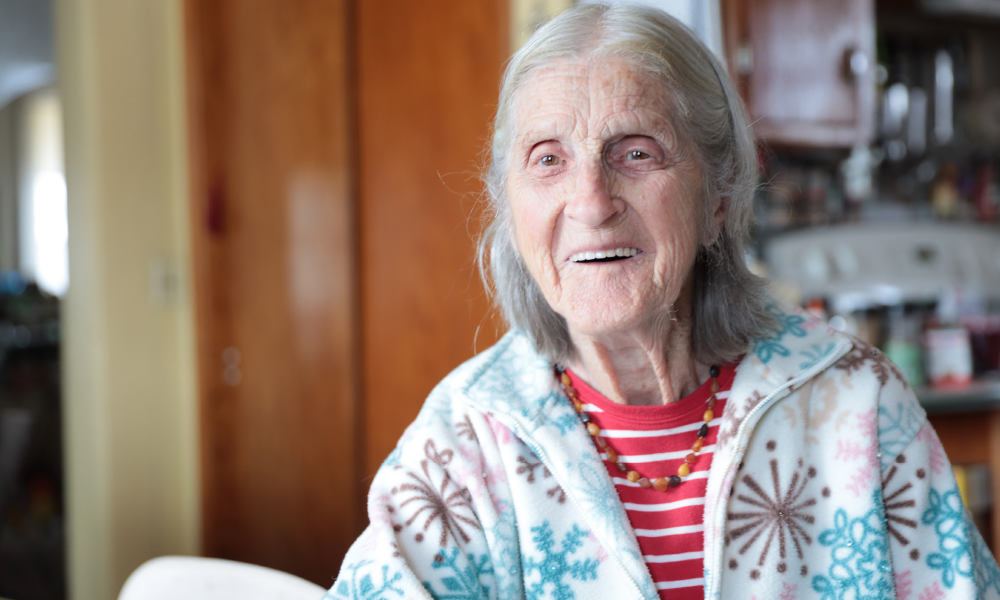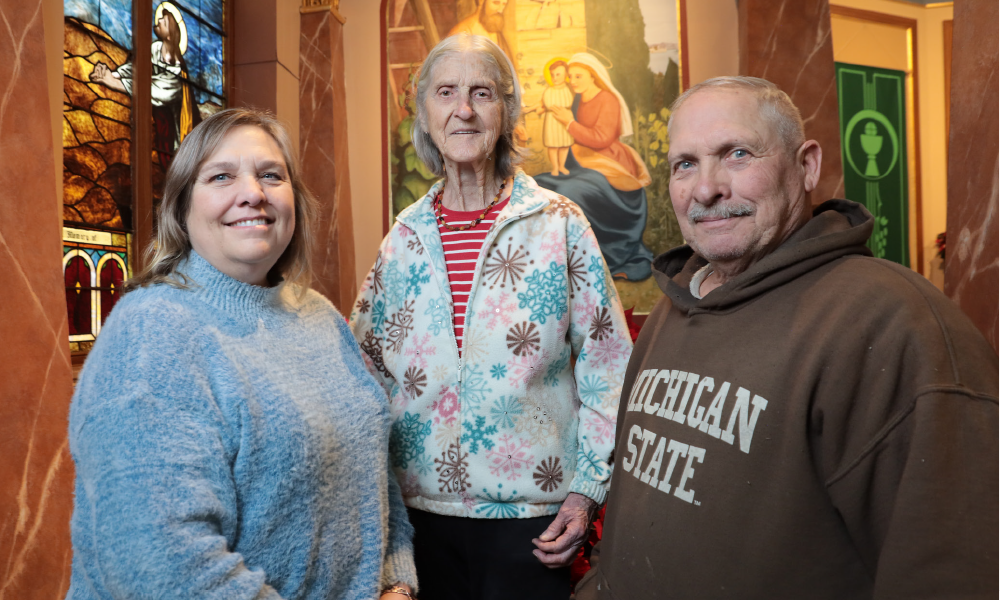
Overwhelmed with gratitude
Gabriele says ‘Thank you America, and thank you God!’
Gabriele says ‘Thank you America, and thank you God!’
Gabriele’s tears are accompanied by a gentle smile. “I’ve had a wonderful life,” she notes, wiping her eyes. “I don’t know why some people do horrible things. But thank you, America, for letting us come here.” Hers is a story marked by suffering and challenges, to which Gabriele has responded with faith and gratitude.
Gabriele’s tears are accompanied by a gentle smile. “I’ve had a wonderful life,” she notes, wiping her eyes. “I don’t know why some people do horrible things. But thank you, America, for letting us come here.” Hers is a story marked by suffering and challenges, to which Gabriele has responded with faith and gratitude.
Born almost 90 years ago on a farm in Lithuania where her parents raised her and her four brothers, Gabriele has fond memories of her early years before WWII took away the simplicity and steadiness of her childhood: “We had a pretty good life. We didn’t know any different – it was good. But when the Russians came the first time, they occupied us. I was probably eight years old. We had a bigger farm than a lot of the others and they took it and gave acres of it away. And then they started taking people to Siberia.”
As tensions rose in Eastern Europe, life became even more unstable for Gabriele’s family. She continues, “Probably in 1941, Germany started coming toward us. I remember seeing two planes shooting at each other and my mom was so happy thinking we were going to be liberated from the Russians. But those Germans weren’t good – they started shooting our Jewish friends. Mom and Dad used to tell us what was happening. At one point the Germans took a Ukrainian family with five children from their home and brought them to us, making them help us work so we could farm and give food to the soldiers.”
The realities of war were such that Gabriele’s older brother Leonard was taken from their home to fight with the German forces, a cousin was captured and killed, and the family constantly feared for their safety in the midst of violence. “We had lots of bombings, I remember hiding from the bombs in a bomb shelter,” she says. When the dangers and hardships grew, Gabriele’s parents packed up their family and left home. “We were walking on the road and there were airplanes shooting right at us. We jumped from the wagon into the ditch and the horses ran away – later we caught up with them. I just thought ‘keep on going, keep on going.’ We got out. The Lord was with us. The Lord helped us,” she says.
Staying at different refugee sites during the war and traveling with only what they could carry, the family made their way to a U.S.-run displaced persons camp by war’s end: “We were there for four or five years and life at the camp was OK. Mom would go and work in the garden to be able to get some bread and eggs and stuff, and the young people had some singing. We had church. And in the camp we had basketball and running, so we did enjoy it a little bit. Our family stayed in just one room, so we all slept very close together, but we had a stove in there. My brothers would go into the woods and set traps to get deer. And once, they dug some dirt out of the floor to make a space to put a little piglet there to raise and butcher and eat. Sometimes the officers would check the rooms and I was afraid that the piglet would squeal!”
In an effort to reunite the family, Gabriele’s dad searched for her brother Leonard before making any decisions about immigrating to a new country.
She explains, “My dad was going on a train through Germany to look for my brother, and putting in the papers that we were looking for him. Finally my brother saw that we were in Germany and were looking for him. He contacted us from France where he had been a prisoner. He came to visit us and he later married a French girl there.”
Unable to go home to Lithuania, Gabriele’s parents arranged to emigrate and start again. “My dad signed up to go to Australia but someone came from America and said they had a sponsor for us, so my dad changed his mind right away. We had to pass all the health tests and consults and then we traveled nine days on the boat and came through Ellis Island in August 1949 – I was 16 years old. When we got here, we found out our sponsor had died,” she says. Unsure of what was to come, Gabriele was hesitant but grateful. God’s providential care continued as he provided a new sponsor, allowing the family to start their new life in Michigan:
“A lot of people couldn’t get out of Germany. We came here to the best times ever.”
After only a year of living in the United States, Gabriele met and married her husband, Raymond, moved into his parents’ farmhouse to help work the 300-acre farm, and joined Sts. James Cornelius and Cyprian Parish in Leslie, Michigan where she has been an active parishioner for 72 years.
Gabrielle continues: “We had a two-day wedding and then we went on a honeymoon to Detroit. I remember seeing the cable cars. I soon learned to drive and I would go visit my mom and dad in a nearby town – I would often stall the car on the side of the road.” Blessed with six children, Gabriele and Raymond’s home life centered around faith and hard work. “We milked cows, grew beans and onions and wheat. We had 300 chickens a year that we raised and butchered to have in the freezer. I went to a couple classes to learn to read and write English. We had a friend who would tape the names of things on things at the house so I could learn the words,” she says. The faith she shared with family has also helped bond her to close friends who are a part of Gabriele’s daily life. “I’ve been at the parish for 72 years. My six kids were baptized there, they served Mass – every funeral and everything. I think we’ve had seven priests.” It is the faith community that supported her when Raymond died in 1999, and more recently with the loss of a son to cancer. “We go out every Friday, some of us. And my prayer group meets every Wednesday. I help at the parish, we do funeral lunches. And our church has beautiful stations of the cross – the most beautiful ever, no church has more beautiful ones.”
Able to visit Lithuania most recently in 2017, Gabrielle prayed in the room where St. Faustina received the images of Divine Mercy from Jesus. That image, other religious icons and photos of her beloved family (now including 12 grandchildren and five great-grandchildren) adorn the farmhouse that Gabriele still calls home. Home, faith, family and friends keep Gabriele grateful. “America took us in. Thank you, America. And thank you God. Always thank God. He saved us!”
America took us in. Thank you, America. And thank you God. Always thank God. He saved us!”

